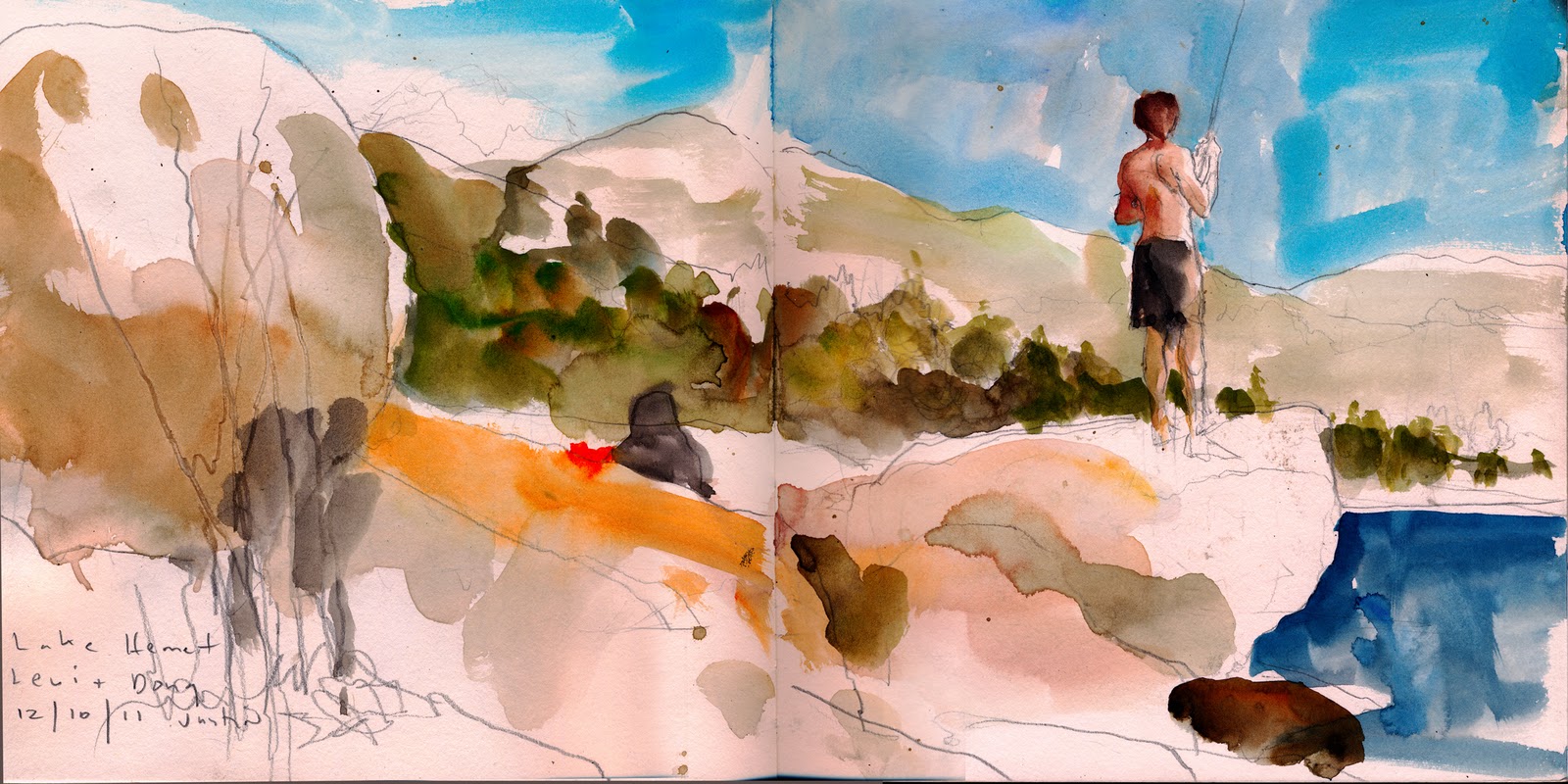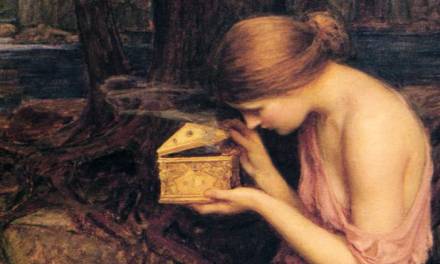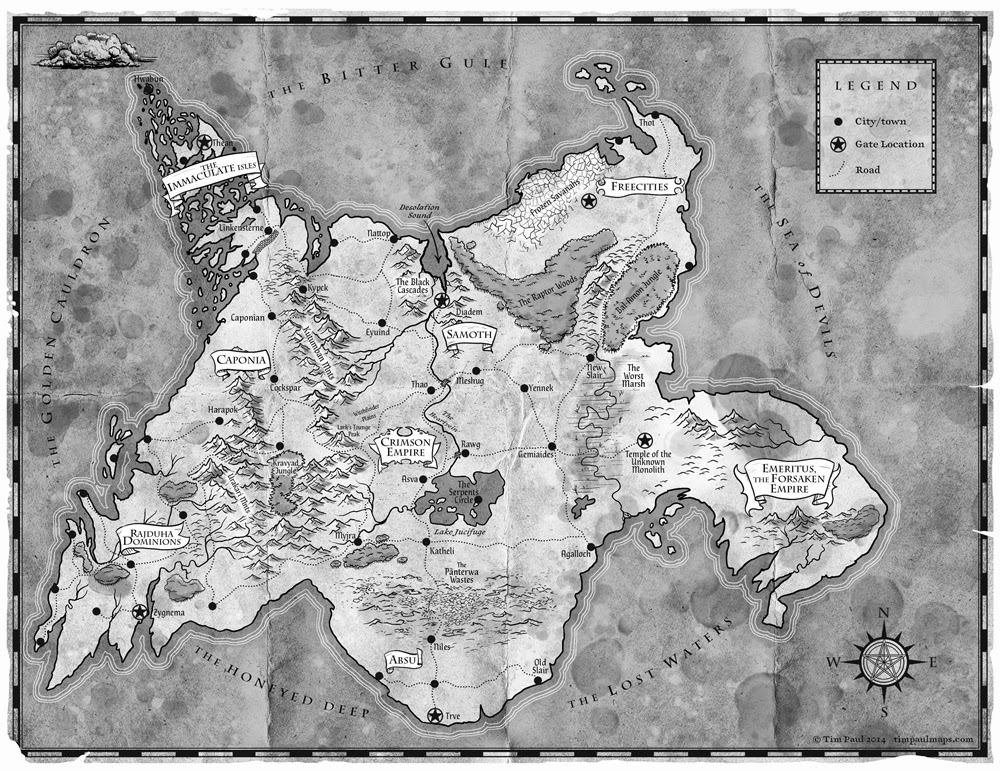I’m here today to tell you that it’s okay if you don’t like your own art.
Whenever artists tell me that they’re feeling down on their art (or whenever I experience the feeling myself) I am reminded of the scene from Westworld where a human traveller, seeking to unravel the mysteries of the dystopian theme park, is told by one of its artifical residents: “the maze wasn’t meant for you.”
Liking your art… wasn’t meant for you.
You’re used to enjoying other people’s art, so it’s only natural that you’d expect to feel the same sense of wonder and joy when you look at your own work – and when you don’t, it’s easy to slide into despair, or start casting around for the missing piece that makes other people’s art so alive, so exciting, while your art just looks like… your art.
I’m here with some reassurance, and a few observations that have seen me through more art slumps than I can count:
You have looked too long to like.
Think of a painting that you love by another artist. How long have you looked at it, total? I mean really sat and STARED at it. Five minutes, spread out across a number of ten-second increments? Maybe twenty minutes, spread out in two-minute increments, a couple of hours max (if you’re one of those people.)
When I’m working on one of my own paintings, I might end up staring at with intense concentration it for anywhere from twenty to sixty hours (possibly up to a hundred, if things are going especially well or especially poorly). Worse, this looking is condensed into a short period of time — maybe a week or two — in which I’m looking at little else in my life, except perhaps a deadline-induced rising tide of dirty dishes.
I challenge you to like anything that you’ve had to look at for so long, and under such circumstances. Fleeting glimpses and first impressions are how we fall in love with a piece of art as viewers — and it’s physically impossible for an artist to experience one of their own pieces in this way.
Liking your art is cyclical.
We were all pretty proud of our early finger paintings…. especially the ones that made it to the fridge. The more you train your eye, though, the worse your art will look — forcing you to improve it. Slowly, your art gets better, and you start to like it again… but now your eye has improved even further, and even your NEW art is starting to look like garbage. Leveling up changes your perception before it changes the product — a constant arms race that will never allow you to rest on your laurels and enjoy the view for too long.
Hating your art is useful.
That dissatisfaction with your art is what makes it better. You’ll spot the problems in your work when you’re feeling insecure about it in a way that you never will when you’re patting yourself on the back about what a virtuoso you are. It’s why some of the better paintings I’ve done were born from scrapping an almost-finished first draft (in the face of the inevitable chorus of “it’s fine”) and doing a re-paint fueled by the fires of hatred.
This is not a justification for self-loathing.
In fact, it’s the opposite. It’s the breathing room to acknowledge that you have value as a human beyond your ability to successfully render wizards. If you find the perceived quality of your art affecting your self-worth, take a moment to acknowledge that you are not your paintings — any more than you are your job, your car, or your khakis. We’ve probably all met “good artists” who are abysmal people, and “bad artists” who are delightful to be around.
If you need help disengaging your self-worth from your art, remind yourself that to a blind person, nothing you’ve drawn or painted even exists. How else can you describe yourself? What other things make your existence interesting, or enjoyable, or meaningful?
Find the things you CAN love.
But back to your art — unless you’re contemplating a career change, you’re stuck with it. Maybe there’s something about your style, or skill set, or the things you choose to paint that you love. But, maybe there isn’t — especially if you’re in one of those slumps where it seems that everything that crawls out of your pencil is garbage. In these instances, there are still plenty of intangibles to get excited about, for example:
I love that my art pays my bills.
I love that my art connects me to people — through conventions and artist hangouts, through sharing my knowledge on Patreon, through friendships I’ve forged with other artists, and all the shared experiences that are unique to being an illustrator.
I love that, even when it falls short of the mark I was aiming for, my art represents a slice of my own personal vision, and my own personal history. Even if I paint something badly, I can rest easy knowing that no one else in the world could have painted it badly in just the same way that I have.
I love that my art liberated me from my life as an office worker, and granted me an almost unimaginable level of self-determinism. I have no master; no god. No one telling me what to do. I am truly free. A spirit… of flame.
Cull the things you truly hate.
There are parts of any life experience that you’re not going to especially enjoy; they are the price of admission that you pay to get to the good parts. (No job title except Chief Executive Puppy Snuggler is going to allow you to feel like you’re snuggling puppies ALL the time).
But, if you’re finding parts of the art experience that you absolutely loathe without reservation, see if you can find a way around them.
Maybe, despite all the figure drawing in the world, you hate the way you draw people. Welcome to your new career as a wildlife artist! Maybe you hate the mess that oil paint creates, or the inevitable hunchback of working long hours at a computer. Congrats, you work in graphite now! Maybe you hate deadlines, and the shadow they cast across the rest of your life. Good thing you’re already setting up your next self-directed project for success!
Know that what YOU see is not what OTHERS see.
I’ve done paintings that I felt were true career-enders… but that my heavy-hitter art heroes went out of their way to show off on social media.
I’ve done paintings that felt like such failures that I literally cried about them… only to have collectors fight over them.
And I’ve been at those low points, where I believed that my art had never been and would never be any good, only to get emails from other artists telling me how my work is so brilliant that it inspired them to start painting again after a slump of their own.
I guess ONE of us has to be wrong…right?
At the end of the day, it’s best not to get too bogged down in agonizing over whether or not you get a thrill from looking at your own paintings. You’ll probably be happier if you can leave the tedious business of enjoying your art to fans and collectors — that’s THEIR job — and focus on your own part of the process: actually making the art.







This is probably one of the most important and unspoken articles I’ve read on muddy colors to date!
Thank you
Really cool thoughs, Wylie! I don’t know why ecxatly, but your article remembers me Modigliani film, with Andy Garcia. This film is both beautiful and tragic, but still a great piece for artists. Maybe I remember that for the artistic journey that is portraited on the sequences Picasso guided Moddigliani, who knows. If you don’t watched yet, I strongly recommended watch, it’s really beautiful and insightful about art history.
This is brilliant and terrifically expressed. It also has the benefit of being truly true. Loved this.
Well said and a very needed bucket of cold water. I like your approach to considering ones art and to focus on the process even more than the end product.
Super useful perspective, especially the time spent viewing your own work versus others.
Would love to see a post with the pieces you mentioned where the results /response weren’t what you expected.
Great advice and perspective- thanks for sharing!
Brilliant article! Full of wit and thought. Thank you
Brilliant advice and a wonderfully written article. Also, do you actually know of anyone hiring a Chief Executive Puppy Snuggler ? Asking for a friend.
This is such wonderful advice for me because I’m entirely too tied up personally in my art. Sometimes I’ll feel successful about a drawing or two, but most the time I’m bogged down with worry over it’s final appearance. Clarity of expression is the most important thing for me, but I feel hobbled by my abilities often. Your article was a real breath of fresh air and a bit of a game changer for me. Thank you.
This was wonderful, Wylie. Hit home pretty hard.
And here’s another artist chiming in to let you know your work has always inspired me over the years. Every time I run into another piece of yours, I get fired back up again.
Thank you so much for sharing, and keep up the wonderful work (even when it doesn’t feel like it to you)
A friend gave me the link to this article and I must thank her! I’ve always loved fantasy art and am taking a class right now and feeling out of my depth. Not liking anything that’s coming from brain to pencil to paper. It’s nice to be reminded that one is not just one’s art…..or any other one aspect of one’s self. It’s reassuring to know that even an artist of your caliber feels this way sometimes. Thank you!
“You have value as a human beyond your ability to successfully render wizards.” I need this bit of advice on my wall. Great article, worth re-reading from time to time.